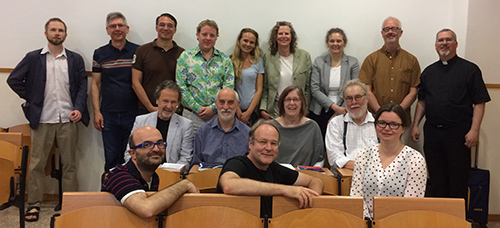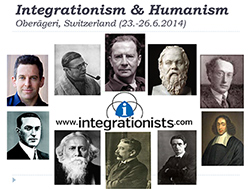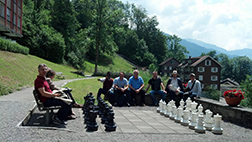Integrationism
Integrationism is a new development in the theory of communication that has far-reaching implications for many social, political, legal, philosophical and psychological issues of our time. It offers a radical departure from traditional Western assumptions about language and communication.
This is the website of the the international association for the integrational study of language and communication (IAISLC).
More about the association ...
Selected conferences

Participants at New Directions in Philosophy of Language and Linguistics, an international conference sponsored by the IAISLC to mark its 20th anniversary, Pontifical Lateran University, Rome 2018
Integrationism and Philosophies of Language: Emerging Alternative Epistemologies in the Global North and the Global South, Pennsylvania State University, 2019, included a series of free workshops for graduate students led by renowned global scholars:
Dorthe Duncker
The workshop is about how integrational linguistics can be applied in practice.
Integrationism invites you to think about your everyday communicational experience, as well as your practice as a professional linguist, in a different way. Integrational linguistics privileges the “first person” perspective, the perspective of the individual communicating agent, and this perspective also defines the perspective of the investigative linguist. It is impossible to leave or to step outside of language in order to study language. Linguistics is in itself a linguistic exercise, and all communicating participants are uniquely situated in time and space. This linguistic reflexivity conditions our lives as communicating participants, and without it linguistics would not be possible. The integrational mindset requires you to think about things you take for granted and to rethink inveterate academic habits. In a sense, you become attentive to your usual inattentiveness, and in return you will realize that no linguistic methodology can be neutral or innocent. For this reason, the notion of “linguistic data” needs to be radically reconsidered for it to be compatible with integrational principles. In the workshop, you will get to have hands-on experience with the challenges an integrational approach poses to the study of linguistic phenomena.
Adrian Pablé
In this workshop I will be discussing different theoretical models of how words are supposed to mean and the beliefs underlying these models.
Drawing on practical examples, we will explore how linguistic beliefs shape communicational activities involving the establishment of ‘reference’ in different domains (e.g. science), which are questions about the ontology of things and how we gain knowledge of them. Against the background of how particular traditions of philosophy and linguistics have approached the issue of 'reference', I will introduce participants to the tenets of an integrational semiology and epistemology based on my own fieldwork on names and discuss how decontextualized analyses of relations between ‘words and things’ mislead our thinking about the status and function of 'names'. Furthermore we will look into Roy Harris’s notion of 'glossing practice' with particular reference to the metalinguistic questions 'What's the name of object x?' and 'What does name x refer to?' and invite participants to imagine situations in which we are called upon to establish reference as a practical communicational activity. In this way, we will be able to highlight the importance of personal linguistic experience as the point of departure for the integrational linguist.
Peter Jones
What we typically experience in face-to-face communication’, as Roy Harris put it, ‘is the temporal development of a single integrated continuum, to which signs of various kinds contribute.’
In this workshop we explore the value of integrationist insights for reflecting on our experiences and observations of a practical task involving face-to-face communication to be carried out during the workshop session. The task requires small groups of participants to cooperate towards a set goal and to endeavour to improve their performance over repeated trials. Of particular interest will be the ways in which participants jointly make of the task activity ‘a single integrated continuum’ through the spontaneous creation and continual transformation in real time of the communicational dimensions of their cooperative relationship.
Details of all IAISLC conferences...
Selected publications
2025 Fang Xuan. Fundamentals of Integrationism and Foundations of Meaning. London: Routledge. (in preparation)
2024 Duncker, Duncker & Adrian Pablé. (Eds). Signs in Activities. New Directions for Integrational Linguistics. London: Routledge.
2023 Sinfree, Makoni et al. (Eds). Integrational Linguistics and Philosophy of Language in the Global South. London: Routledge.
2017 Adrian Pablé (Ed) Critical Humanist Perspectives.
[Free preview of the first couple of chapters at Google Books]
2015 A. Pablé and C. Hutton, Signs, Meaning and Experience. Integrational Approaches to Linguistics and Semiotics (= Semiotics, Communication and Cognition 15), Berlin: Mouton De Gruyter. xvii + 180pp. Also available at Amazon
2015 D. Bade, R. Harris, C. Conrad (Compilers) Roy Harris and Integrational Semiology 1956-2015: A bibliography
2011 David Bade and Adrian Pablé (Eds) Linguistics Out of Bounds: Explorations in Integrational Linguistics in Honour of Roy Harris on his 80th Birthday Language Sciences, Volume 33, Issue 4
35 short articles from many scholars on various aspects of Roy Harris’s work, including a survey of published reviews, and a Roy Harris bibliography for 1996-2010
Paperback edition of
2009 Michael Toolan (Ed)
Language Teaching: Integrational Linguistic Approaches
New York: Routledge.
This book demonstrates the relevance of an integrational linguistic perspective to a practical, real-world need, namely the learning of languages
For a full list, see Publications



